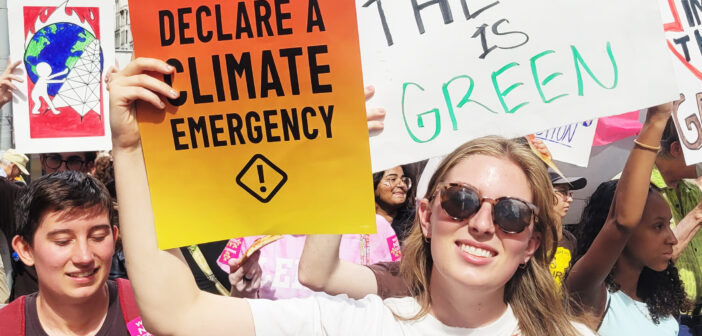Various groups and individuals on campus, from clubs to faculty members, are participating in the battle against climate change through research, protests, donations and events.
Arup SenGupta, professor of civil and environmental engineering, hosted a Mountain Talk earlier this month where he discussed the current state of carbon capture technology and unveiled innovative materials he thinks have the potential to address the ongoing climate crisis.
SenGupta said carbon capture technology is a vital tool in the fight against climate change.
According to the Environmental Energy Agency, carbon capture, utilization and storage involves the capture of carbon dioxide — from places like power generation or industrial facilities — to be compressed and transported for reuse or to be injected into deep geological formations.
Carbon capture technology helps tackle emissions in hard-to-abate sectors, especially heavy industries like steel, cement or chemicals, according to the agency. This technology supports the decarbonization of parts of the energy system including trucks and ships, and it can remove carbon dioxide from the air to balance unavoidable emissions.
SenGupta said three primary ways to reduce carbon dioxide emissions are replacing fossil fuels with renewable energy, controlling emissions from point sources and direct air capture.
He said there is significance in taking worldwide action, especially for countries that are disproportionately affected by rising carbon dioxide levels.
“Inclusive technology,” or technology that is not limited to application by the U.S. or a small number of countries is necessary, SenGupta said.
“We consider this climate change to be the third World War,” SenGupta said. “We need a lot of allied forces.”
One force is the U.N. Climate Ambition Summit, which the United Nations Secretary-General convened to discuss climate change and accelerate action.
According to the United Nations, the Summit “represents a critical political milestone for demonstrating that there is a collective global will to accelerate the pace and scale of a just transition to a more equitable renewable-energy based, climate-resilient global economy.”
The Summit organized the March to End Fossil Fuels, which members of Lehigh’s Student Political Action Coalition attended in New York City on Sept. 17.
There were an estimated 75,000 people at the protest, exceeding the initial expectation of 20,000 attendees.
According to the official website for the march, it was “the largest demonstration pressuring (U.S. President) Biden since he took office and the largest climate mobilization since the start of the pandemic.”
Student Political Action Coalition member Ciaran Buitrago, ‘25, said the protest was one of the best experiences of his life.
“I am deeply passionate about the climate,” Buitrago said. “When I saw that this huge mobilization was happening, I knew I wanted to bring Lehigh students as well as myself there because I feel like we’re all youth and we need to be involved in this movement because it’s our future that’s on the line.”

Students organize in Farrington Square awaiting travel to New York City on Sept. 17. Members of Lehigh’s SPAC joined an estimated 75,000 people at the protest. (Courtesy of SPAC)
Sarah Wilhelm, executive board member of the Lehigh Conservation Club, shares a similar motivation. She organizes events Lehigh students can participate in to help address environmental challenges including routine clothing swaps and trash pick-ups on the South Side.
She said contributions to the cause don’t have to come out of one’s wallet, though Buitrago said “every little bit counts” when it comes to donating to organizations and legal funds.
Rather, Wilhelm said individual action is incredibly important, and she encourages people to adopt sustainable habits such as reducing waste, saving energy and conserving water.
“Not everything has to be monetary,” Wilhelm said. “It could just be a behavioral change or just making people aware.”






Comment policy
Comments posted to The Brown and White website are reviewed by a moderator before being approved. Incendiary speech or harassing language, including comments targeted at individuals, may be deemed unacceptable and not published. Spam and other soliciting will also be declined.
The Brown and White also reserves the right to not publish entirely anonymous comments.